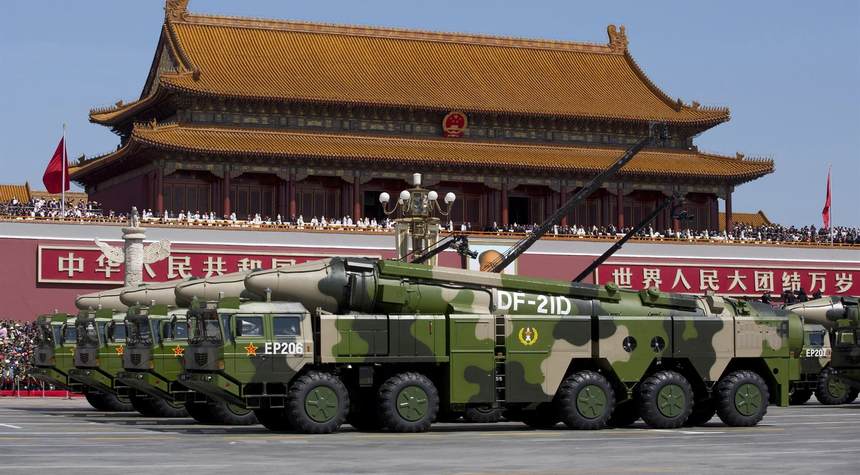We Are Perilously Close to a Post-American World

After the fall of Saigon, the Soviet Union began five years of aggressive subversion around the world, culminating in the invasion of Afghanistan at the end of 1979. Henry Kissinger and the elites in the US and Europe all predicted a Russian victory in the Cold War. The fall of Kabul is worse: In Vietnam, we faced a well-trained and equipped North Vietnamese Army; we were humiliated by 75,000 rag-tag irregulars in Afghanistan.
The big difference is that China’s economy is fifty times bigger than it was in 1975 — $11.8 trillion in constant 2010 prices, vs. $250 billion in 1975. That’s what happens when you grow at 8% a year for fifty years. China’s exports to the U.S.–now running at an all-time record–are just 3.5% of China’s $15 trillion GDP. But they comprise a fifth of all U.S. consumption of manufactured goods. It would take $1 trillion or more and perhaps a decade to replace most of America’s dependency on Chinese imports, especially electronics. Among other things, we would have to train hundreds of thousands of engineers and skilled workers.
You learned everything you need to know about Chinese foreign policy from “The Godfather” — keep your friends close and your enemies closer. China’s main concern is an Islamist insurgency in Xinjiang, and several thousand Uyghur jihadists trained in Syria and elsewhere who have returned to China. Russia’s main concern is jihad among its Muslim minority, a fifth of the population of the Russian Federation.
China’s “Godfather” move is to recognize the Taliban while admonishing them to stay out of Xinjiang and leave the Uyghurs to their fate. China and Russia are cementing their alliance with Iran, which provided weapons to the Taliban. Iran will join the Sino-Russian umbrella group, the Shanghai Cooperation Organization. China will invest in Iran’s oil and gas, while it builds pipelines frantically to secure hydrocarbon supply from places the U.S. can’t touch.
The Biden administration is now begging Beijing and Moscow for help in Afghanistan. That will be expensive, as the South China Morning Postreports this morning:
US Secretary of State Antony Blinken picked up the phone on Monday to Chinese Foreign Minister Wang Yi for a discussion on how the two countries could work together to achieve a “soft landing” for Afghanistan. He was told Beijing was willing, but Washington would need to step back the pressure on its greatest rival, according to China’s state media.
Wang earlier had spoken to his Russian counterpart Sergey Lavrov, with both sides agreeing that Beijing and Moscow should step up their communication and coordination over the Afghanistan situation.
In a flurry of diplomatic phone calls, Blinken also spoke to Lavrov, as well as Nato’s secretary general Jens Stoltenberg, the European Union’s high representative Josep Borrell and foreign ministers from Pakistan, Britain and Turkey, in the aftermath of the chaotic fall of the Afghan government as the Taliban took over Kabul and the presidential palace on Monday.
One reason that Blinken is so solicitous toward Moscow and Beijing is the presence of 10,000 American citizens in Afghanistan, all potential hostages.
More broadly, the Biden administration finds itself in the miserable position of having to adjust to the collapse of an overreaching American policy.
China’s foreign minister told Blinken that he would be happy to help, at a price:
In his conversation with Blinken, Wang Yi opposed the US move that it engages in deliberate all-around suppression of China to harm China’s interests but asks China to cooperate with it. It is very necessary at this moment to directly point out that the US is a strategic rogue.
China will be keen to restore order in Afghanistan and promote reconstruction of this war-torn country, but it has no obligation to help the US get out of a strategic dilemma that entirely belongs to Washington. When the US is maliciously carrying out strategic coercion and containment against China, there is no need for China to win US favor by rendering good for evil. That will not work.
The Biden Administration’s blundering in Afghanistan exposed an inherently weak American position.
- Despite the Trump tariffs, the U.S. is more dependent on China than ever before.
- Despite the tech sanctions, China is able to manufacture most of the chips it needs, enough to support its massive 5G buildout and Fourth Industrial Revolution applications.
- The China-Russia alliance is now set in stone, with massive Chinese investment in Russian hydrocarbons (delivered to China by pipeline where the U.S. can’t interdict them), and a common interest in containing jihadis in Central Asia.
- China and Russia can insulate Iran against U.S. sanctions and now have formally invited Iran into their umbrella organization, the Shanghai Cooperation Organization.
- The threat to India from China’s ally Pakistan just escalated, as Pakistan’s president Imran Kahn hailed the Taliban for “breaking the shackles of slavery.”
If we want to remain a world power, we need to throw out Biden’s multi-trillion dollar handouts to his political constituencies and invest trillions in manufacturing, infrastructure, and R&D. Right now our credibility is at a fifty-year low, and time is running out.
